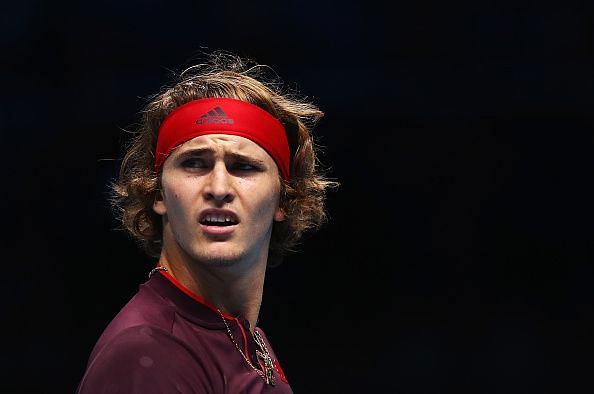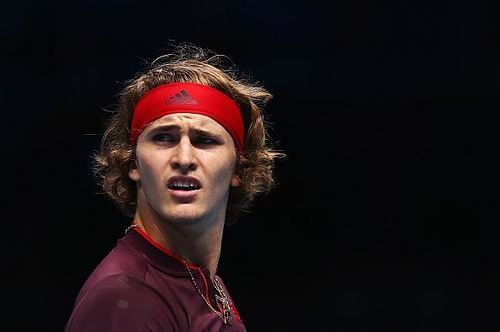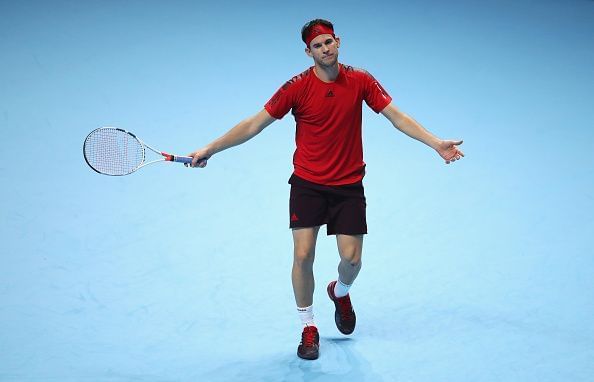
ATP Finals 2017 diary: Zverev and Thiem discover the joys and pitfalls of the 'spotlight'

The O2 Arena may not have the most gladiatorial feel to it, and it certainly doesn't have as much history as Court Phillippe Chatrier and Wimbledon's Centre Court do. But it puts the spotlight on the players in a way that few other tennis venues can.
The stands are shrouded in darkness for the most part, illuminated only by the spectators' camera flashes and the overhanging bulbs whose primary purpose is to light up the playing area of the court. And as each player makes his way to the centre, the blinding spotlight follows him like a shadow, making his presence felt to every single person in the stadium.
That isolated spotlight stays with the players whenever the ball is in play, and only relents during the changeovers and sit-downs. How must if feel for someone barely out of his teens to literally be the cynosure of all eyes?
For Alexander Zverev and Dominic Thiem, it must have felt like a blessing as well as a curse.
The German in particular seemed to revel in the newfound attention at the start, winning three of his first five sets on perhaps the loneliest big stage in the sport. His forehand continued to give him problems, but he served with aplomb and came up with his best defensive tennis to outlast Marin Cilic and give Roger Federer a run for his money. He also fed off the crowd's energy, throwing up exaggerated fist-pumps at nearly every big point he won.
But it didn't take a lot for all that hard work to come crashing down. With a semifinal spot on his racquet as he went a break up in the third set against Jack Sock, Zverev shrank - from the spotlight, from the ball, and even seemingly from the competition.
When a player makes four double faults to get broken twice in successive games, you know there's something other than mere serves and groundstrokes at play. And the 20-year-old didn't shy away from calling it what it was.
"I choked," was Zverev's simple explanation when asked what went wrong in his post-match press conference. He blamed his nerves for faltering down the stretch, said that the game he played to get broken at 4-5 in the third was his 'worst of the season', and calmly admitted that this, along with the loss to Borna Coric at the US Open, was his most inexplicable loss of the year. He said all this in a rapid-fire monologue, in the space of one minute.
We almost didn't want to ask him any more questions after that. It took a little time to process the full impact of what he had just said; to understand just how broken he must have felt inside to be that brutal with his self-assessment.
Zverev didn't need to feel that broken. By all accounts, he has had a terrific year; one in which he won two Masters titles, notched up wins over Federer and Novak Djokovic, and broke into the top 3 - all before he's even turned 21.
But he was given a taste of the spotlight at the O2, and he didn't want to be deprived of it so soon. Here in London, Zverev was a star - the stands were nearly full for every one of his matches. To not make the semifinals when so many eyes were on him was unforgivable in Zverev's mind - even if it shouldn't have been.

For Thiem, the equation was a little more straightforward. This was his second appearance at the ATP Finals, and his chances, just like last year, were slim. Indoor hardcourt is not his surface, and he had been riding a rather terrible run of form since the end of the US Open.
Had he managed to reach the semifinal, it would've been considered a big surprise and an even bigger achievement.
But the few expectations from him before the tournament were dashed when he went down to Grigor Dimitrov despite playing some of his best tennis in months. If he couldn't best Dimitrov with his strongest stuff, what hope did he have against Rafael Nadal?
Then, however, the members of his group were thrown a lifeline as Nadal announced his withdrawal from the tournament. Suddenly, all Thiem had to do was defeat Pablo Carreno Busta (almost a given) and somehow get past David Goffin (who had been allowed just two games against Dimitrov) to reach his biggest hardcourt semifinal.
The spotlight burned brighter than ever. But unfortunately for Thiem, that also brought to a head all the miles and aches he had been accumulating on his body over the course of yet another unnecessarily long season.
After getting an early 3-0 lead he started slowing down, even as Goffin grew in confidence at the other end. By the middle of the second set Thiem was flailing at most of his backhands, unable to get into position quickly enough. And by the end of the match he was double faulting his way out of the tournament, much to the dismay of the crowd.
As it always is with Thiem though, there was just enough evidence in the match to suggest that maybe the result could have been different; that maybe in the future the result will be different. His booming forehand winners make for a sight unlike anything else in the sport, and even on a day when his backhand is misfiring horribly, he still makes a few searing crosscourt strikes that draw gasps from the stands.
Did he choke too, like Zverev? Did the spotlight get too bright for him? After the match I asked Thiem whether he thought he was making progress at the big events, and whether he was getting a little more used to playing in the spotlight. But the Austrian was having none of it.
"(It) has nothing to do with the tournaments. I think I'm used to play(ing) big events. The thing is that at the big events, there are big players, strong players. If you play bad against them, you will lose easy. That's the only thing which is tough about it," he said.
That certainly makes a lot of sense. But it also begs the question whether Thiem really is a middling enough player to lose four out of his six matches at the year-end championships just because there are 'big players' here, when the similarly statured David Goffin and Jack Sock have made it to the semis already.
The good thing is that both Thiem and Zverev have plenty of time on their hands, and it is almost inevitable that they will one day reach the semifinals or beyond at the Finals. They will likely have embraced the spotlight more fully by then, prepared to face the blinding attention that the O2 arena so ruthlessly showers on its performers.
Until that day arrives though, they'd want to continue reveling in the shadows - climbing up one step at a time, while the world is looking elsewhere.